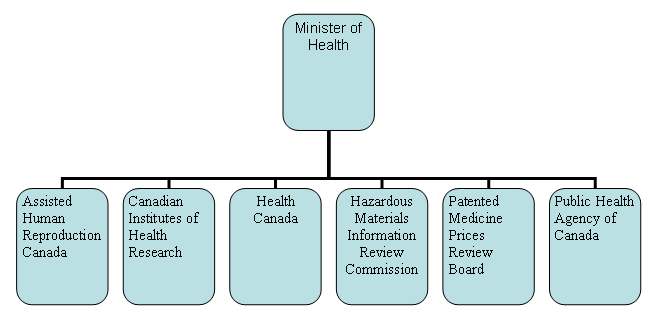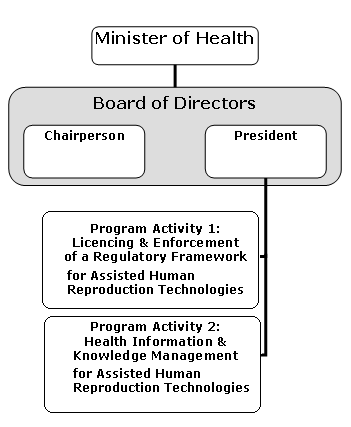ARCHIVED - Assisted Human Reproduction Canada
 This page has been archived.
This page has been archived.
Archived Content
Information identified as archived on the Web is for reference, research or recordkeeping purposes. It has not been altered or updated after the date of archiving. Web pages that are archived on the Web are not subject to the Government of Canada Web Standards. As per the Communications Policy of the Government of Canada, you can request alternate formats on the "Contact Us" page.
2008-2009
Reports on Plans and Priorities
Assisted Human Reproduction Canada
The Honourable Tony Clement
Minister of Health
Table of Contents
- Minister's Message
- President's Message
- Management Representation Statement
- Health Portfolio Overview
- Mandate
- Organizational Information
- Program Activity Architecture (PAA) Crosswalk
- Voted and Statutory Items Displayed in the Main Estimates
- Departmental Planned Spending Table and Full Time Equivalents
- Summary Information
- Program Activities by Strategic Outcome
- Departmental Plans and Priorities
Section II - Analysis of Program Activities by Strategic Outcome
- Analysis by Program Activity
- Strategic Outcome:
- Program Activity #1: Licensing and Enforcement of a Regulatory Framework for Assisted Human Reproduction Technologies
- Program Activity #2: Health Information and Knowledge Management for Assisted Human Reproduction Technologies
Section III - Supplementary Information
- Table 1: Departmental Links to the Government of Canada Outcomes
- Table 2: Sustainable Development Strategy
- Table 3: Evaluations
- Table 4: Green Procurement
Section I - overview
Minister's Message

It is my pleasure to present the 2008-2009 Report on Plans and Priorities for Assisted Human Reproduction Canada (AHRC).
AHRC is the federal regulatory agency responsible for protecting and promoting the health and safety, human dignity and human rights of Canadians who use or are born of assisted human reproduction technologies, and to foster ethical principles in relation to assisted human reproduction.
In fulfilling its mandate, AHRC will exercise powers in relation to licenses; designate inspectors to enforce the requirements of the Assisted Human Reproduction Act; maintain relationships with stakeholders including health practitioners, patients and researchers; collect, analyse and manage health reporting information relating to controlled activities; provide information to the public and to the professions on matters to which the Act applies; monitor technological advances and trends in assisted human reproduction; and provide advice to me, the Minister of Health, on assisted human reproduction.
In addition to establishing its Vancouver and Ottawa offices, the Agency is recruiting a strong team of professionals to build a responsible and effective regulatory and enforcement Agency for assisted human reproduction. I am proud that the Agency has been inclusive in its efforts to engage key stakeholders in identifying needs, priorities and in managing expectations. The Agency has made significant progress putting in place the infrastructure and networks necessary to safeguard the health and safety of Canadians building their families through assisted reproductive technologies (ART).
The fiscal year 2008/2009 will see the Agency consolidate and build on its early successes under the strong leadership of its Board of Directors and management team.
Tony Clement
Minister of Health
President's Message

Through the strong leadership of our Board of Directors,
AHRC has made considerable progress over the past year,
and will continue to do so over the next three years.
Since assuming my responsibilities as President of AHRC
on February 14, 2007, my priorities have been to:
- start building, from the ground up, a dynamic, accountable and highly professional agency that can deliver effective licensing, inspection and enforcement services, a health reporting information registry that can become a part of a broader health surveillance system as well as timely and relevant information about assisted human reproduction to health professionals and the
public; and
- engage health professionals, patients and other key stakeholders, both within and outside of government, in order to better understand their issues and expectations in relation to AHRC’s regulatory responsibilities.
I am pleased to report that we have already made considerable progress towards these objectives.
We are already exercising our existing regulatory authorities under the Assisted Human Reproduction Act. Over the coming months, we will continue to engage our partners and stakeholders in identifying gaps and opportunities relevant to our Agency's mandate, use our expertise and networks to contribute to efforts to develop an effective regulatory regime for AHR in Canada, and build our Agency's core infrastructure and capacity to immediately implement new AHR regulations as they come into force. We are well on our way to building a regulatory agency for AHR in which all Canadians can take pride.
Dr. Elinor Wilson
President
Management Representation Statement
I submit for tabling in Parliament, the 2008-09 Report on Plans and Priorities (RPP) for Assisted Human Reproduction Canada.
This document has been prepared based on the reporting principles contained in Guide for the Preparation of Part III of the 2008-09 Estimates: Reports on Plans and Priorities and Departmental Performance Reports:
- It adheres to the specific reporting requirements outlined in the Treasury Board of Canada Secretariat guidance;
- It is based on the department's strategic outcome and Program Activity Architecture that were approved by the Treasury Board;
- It presents consistent, comprehensive, balanced and reliable information;
- It provides a basis of accountability for the results achieved with the resources and authorities entrusted to it; and
- It reports finances based on approved planned spending numbers from the Treasury Board of Canada Secretariat.
_______________________________________
Name: Elinor Wilson
Title: President
Assisted Human Reproduction Canada
Health Portfolio Overview
The Minister of Health is responsible for maintaining and improving the health of Canadians. These efforts are supported by the Health Portfolio which includes Health Canada, the Public Health Agency of Canada, the Canadian Institutes of Health Research, the Hazardous Materials Information Review Commission, the Patented Medicine Prices Review Board and Assisted Human Reproduction Canada. Each member of the Portfolio prepares its own Report on Plans and Priorities.

Mandate
The Assisted Human Reproduction Agency of Canada (AHRC) was established under the authority of the Assisted Human Reproduction Act. The Act seeks to protect and promote human health, safety, dignity and human rights in the use of assisted human reproduction (AHR) technologies, prohibits unacceptable activities, such as human cloning and places controls over AHR related research. The Agency is responsible for the issuance and review of licences, the development and management of a health reporting information registry and health surveillance system and for carrying out inspections, compliance and enforcement activities related to activities controlled under the Act. The Agency is also a centre of expertise and a focal point of AHR information for policy makers, health professionals and Canadians.
Organizational Information
Assisted Human Reproduction Canada

Program Activity Architecture (PAA) Crosswalk
The program for 2008-09 is unchanged from 2007-08. The appointments of the Board of Directors, including the Chairperson of the Board, the President of the Agency and eight members were announced in December 2006 (a ninth board member was appointed in September 2007). The President of Assisted Human Reproduction Canada assumed office in February 2007. There have been no changes to the Program Activity Architecture (PAA) strategic outcome and program activities.
Voted and Statutory Items Displayed in the Main Estimates
| Vote or Statutory Item ( $ thousands) | Truncated Vote or Statutory Wording | 2008-09 Main Estimates | 2007-08 Main Estimates |
|---|---|---|---|
| 15 | Operating expenditures | $11,783 | $12,834 |
| (S) | Contributions to employee benefit plans | 635 | 642 |
| Total | $12,418 | $13,476 |
Departmental Planned Spending Table and Full Time Equivalents
| (in $ thousands) | Forecast Spending 2007-08 | Planned Spending 2008-09 | Planned Spending 2009-10 | Planned Spending 2010-11 |
|---|---|---|---|---|
| Licensing and Enforcement of a Regulatory Framework for Assisted Human Reproduction Technologies | 6,076 | 7,803 | 5,950 | 5,950 |
| Health Information and Knowledge Management for Assisted Human Reproduction Technologies | 7,400 | 4,615 | 4,574 | 4,574 |
| Budgetary Main Estimates (gross) | 13,476 | 12,418 | 10,524 | 10,524 |
| Non-budgetary Main Estimates (gross) | 0 | 0 | 0 | 0 |
| Less: Respendable revenue | 0 | 0 | 0 | 0 |
| Total Main Estimates | 13,476 | 12,418 | 10,524 | 10,524 |
| Adjustments | ||||
| Other | ||||
| Employee Benefit Plan (EBP) | ||||
| Total Adjustments | ||||
| Total Planned Spending | 13,476 | 12,418 | 10,524 | 10,524 |
| Less: Non-respendable revenue | 0 | 0 | 0 | 0 |
| Plus: Cost of services received without charge | 0 | 0 | 0 | 0 |
| Total Departmental Spending | 13,476 | 12,418 | 10,524 | 10,524 |
| Full-time Equivalents | 44 | 44 | 44 | 44 |
The Agency will continue to monitor and enforce compliance with the AHR legislative and regulatory framework as it builds its capacity to protect and promote the health and safety of donors, patients and offspring born of assisted human reproduction technologies. Accordingly, its emphasis will be on staffing and preparing its systems for the upcoming regulations. Once the regulations are passed and the Agency begins to implement them, its spending will become more centred on operations.
Summary Information
Financial Resources (in $ thousands)
| 2008-09 | 2009-10 | 2010-11 |
|---|---|---|
| $12,418 | $10,524 | $10,524 |
Human Resources
| 2008-09 | 2009-10 | 2010-11 |
|---|---|---|
| 44 | 44 | 44 |
Departmental Priorities
| Name | Type |
|---|---|
| 1. To protect and promote the health and safety of Canadians who use, and offspring who are born of, AHR technologies | ongoing |
| 2. To contribute to the development of Health Canada's AHR regulations | intermediate term |
| 3. To create the capacity in AHRC to implement the regulations | intermediate term |
| 4. To develop the tools to disseminate information on AHR | ongoing |
| 5. To increase the awareness of Canadians and health professionals about AHR and the Agency's role | ongoing |
Program Activities by Strategic Outcome
| Planned Spending | |||||
|---|---|---|---|---|---|
| (in $ thousands) | Expected Results | 2008-09 | 2009-10 | 2010-11 | Contributes to the following priority |
| Strategic Outcome: | Protection and promotion of the health and safety of Canadians against the risks associated with assisted human reproduction technologies | Priorities 1, 2, 3, 4 and 5 | |||
| Program Activity: Licensing and Enforcement of a Regulatory Framework for Assisted Human Reproduction Technologies. |
|
7,803 | 5,950 | 5,950 | Priorities 1, 2, 3, 4 and 5 |
| Program Activity: Health Information and Knowledge Management for Assisted Human Reproduction Technologies. |
|
4,615 | 4,574 | 4,574 | Priorities 1, 2, 3, 4 and 5 |
Departmental Plans and Priorities
The Assisted Human Reproduction Agency of Canada (AHRC) was formally established by Orders in Council on January 12, 2006. AHRC is mandated to administer the Assisted Human Reproduction Act (Bill C-6: an Act Respecting Assisted Human Reproduction and Related Research) on behalf of the Minister of Health. Section 24 of the AHR Act describes AHRC's roles and objectives. These objectives include protecting and promoting the health and safety of donors, patients and offspring born of AHR technologies by becoming a centre of expertise for administering a comprehensive legislative and regulatory framework that enforces prohibitions and regulates acceptable controlled activities in Canada. To that end, in the period prior to a full set of regulations being in force, and throughout Fiscal Year 2008-2009, AHRC will have several functions to perform, including:
- developing the groundwork to implement a licensing framework for controlled activities, including AHR procedures;
- developing an inspection strategy to ensure compliance with the AHR Act and regulations;
- communicating to and engaging stakeholders with AHR issues;
- developing a personal health information registry, and exploring a surveillance strategy;
- collecting and disseminating public information;
- providing advice to the Minister of Health;
- providing support to the Board of Directors; and
- planning and administration.
These functions will be conducted and reported upon through two program activities including:
- Regulatory Framework Development; and
- Centre of Excellence on Information for AHR (including the development of a Personal Health Information Registry).
Section II - Analysis of Program Activities by Strategic Outcome
Analysis by Program Activity
Strategic Outcome:
Protection and promotion of the health and safety of Canadians against the risks associated with assisted human reproduction technologies.
Program Activity #1: Licensing and Enforcement of a Regulatory Framework for Assisted Human Reproduction Technologies
(In the period leading up to the finalization of the regulations by Health Canada specific to licensing, AHRC will continue to focus on monitoring and enforcing compliance with regulated controlled activities under the AHR Act and on the development of a Regulatory Framework for Assisted Human Reproduction Technologies.)
Financial Resources
(in $ thousands)
| 2008-09 | 2009-10 | 2010-11 |
|---|---|---|
| $7,803 | $5,950 | $5,950 |
Human Resources
| 2008-09 | 2009-10 | 2010-11 |
|---|---|---|
| 22 FTE | 22 FTE | 22 FTE |
Objective
To develop the necessary infrastructure to monitor and enforce compliance with the AHR legislative and regulatory framework immediately upon its coming into force.
Description:
AHRC would achieve this objective by:
- developing guidance documents, administrative polices, and electronic tracking systems for the licensing and inspection of AHR clinics and facilities;
- enlisting the participation or support of key stakeholder groups, professional associations, Colleges, and licensing and accreditation bodies in the development of other relevant supporting policy instruments (e.g., standards, national guidelines, accreditation models, etc.); and
- developing, through a broad and inclusive process of consultation with key stakeholders, a Personal Health Information Registry that may function as a component of a broader AHR surveillance network.
Expected results
The preliminary key results for this program activity include:
- an effective and efficient licensing and inspection framework; and
- a well-informed and engaged stakeholder community.
Performance measurement indicators
The performance indicators for the Agency are:
- once the regulations are passed, a documented licensing and inspection framework which is communicated to clinics and stakeholders and which sees inspections carried out on a basis consistent with the framework; and
- communicating the framework to the stakeholders by various means including direct contact, presentations at professional forums, literature and electronic means such as a website.
Program Activity #2: Health Information and Knowledge Management for Assisted Human Reproduction Technologies
(In the period leading up to the finalization of the regulations by Health Canada, AHRC will focus on developing the tools necessary to become a centre of expertise and a focal point for information on Assisted Human Reproduction.)
Financial Resources
(in $ thousands)
| 2008-09 | 2009-10 | 2010-11 |
|---|---|---|
| $4,615 | $4,574 | $4,574 |
Human Resources
| 2008-09 | 2009-10 | 2010-11 |
|---|---|---|
| 22 FTE | 22 FTE | 22 FTE |
Objective:
To become a centre of expertise and focal point of AHR information for policy makers, practitioners, patients, offspring born of AHR procedures, researchers and the Canadian public.
Description:
AHRC would achieve this objective by:
- developing a Personal Health Information Registry that may function as a component of a broader AHR surveillance network;
- establishing a Science Advisory Panel that can provide AHRC with value-added counsel and advice in relation to advances and emerging scientific issues related to Assisted Human Reproduction;
- partnering with the Canadian Institutes for Health Research (CIHR) to ensure research AHRC's mandate be met in a timely, rigorous, transparent and cost-effective manner consistent with the terms of the MOU which AHRC is finalizing with CIHR;
- liaising with counterpart AHR agencies around the world with a view to sharing best-practices and encouraging common approaches to regulating the safety and effectiveness of AHR consistent with ethical principles;
- developing and maintaining a website with relevant information for patients, providers, practitioners and children born of assisted human reproduction, links to trusted websites, reports commissioned by AHRC, Board Agendas and Minutes, etc.;
- providing information for health professionals and the public on AHR matters or issues via newsletters, presentations at conferences, annual reports, brochures, and reports in journals; and
- working collaboratively with the provinces and territories to identify and reconcile issues of common concern and to develop an effective, efficient and seamless AHR regime that protects the health and safety of all Canadians and children born of AHR.
Expected Results
The preliminary key results for this program activity include:
- a Personal Health Information Registry that complements an eventual AHR surveillance network;
- establishment of a Science Advisory Panel;
- implementation of a research agenda pertaining to AHR;
- direct contact with counterpart international AHR agencies;
- an AHRC website and other tools to disseminate information;
- increased awareness of, and collaboration with, AHRC by stakeholders and the Canadian public; and
- identification and reconciliation of issues of common concern with the provinces.
Performance measurement indicators
The performance indicators for the Agency are:
- the successful development of a Personal Health Information Registry that is integrated into an overall surveillance network, once the regulations are developed;
- the successful establishment of a Science Advisory Panel;
- programs and initiatives to advance AHR research pertaining to AHRC's mandate;
- participation in and hosting of forums to exchange information with counterpart AHR Agencies;
- the successful launch of a website and other information tools that allow for external feedback;
- the increased flow of information on AHR to stakeholders and the public via a range of outreach vehicles and partnerships; and
- increased coordination and collaboration on AHR issues across jurisdictions.
Section III - Supplementary Information
Table 1: Departmental Links to the Government of Canada Outcomes
| Strategic Outcome: Protection and promotion of the health and safety of Canadians against the risks associated with assisted human reproduction | |||||
|---|---|---|---|---|---|
| (in $ thousands) | Expected Results | Planned Spending | Alignment to Government of Canada Outcome Area | ||
| 2008-09 | 2009-10 | 2010-11 | |||
| Program Activity: Licensing and Enforcement of a Regulatory Framework for AHR Technologies |
|
$7,803 | $5,950 | $5,950 | contributes to the achievement of the Government of Canada's "Healthy Canadians" outcome. |
| Program Activity: Health Information and Knowledge Management for AHR Technologies |
|
$4,615 | $4,574 | $4,574 | contributes to the achievement of the Government of Canada's "Healthy Canadians" outcome. |
Table 2: Sustainable Development Strategy
| The Agency began operations in February 2007. It is in the early stages of developing a Sustainable Development Strategy. The Agency will develop its strategy in accordance with the Auditor General Act which lays out the principles of the strategy. |
Table 3: Evaluations
| 1. No audits have been set as the Agency's Board of Directors could not begin functioning until the President took office in February 2007. The Agency began operations in the 2007-08 fiscal year. The Agency is required to comply with the Treasury Board's Internal Audit Policy and related directives as applicable. The Agency reports on the performance of all its initiatives
on a regular basis through Main Estimates, using the Report on Plans and Priorities and the Agency's Performance Report. The preliminary Program Activity Architecture (PAA) has been developed for AHRC and will be used to build the Management Resources and Results Structure (MRRS) for the Agency, as a vehicle to report performance. 2. As a new organization, AHRC has focussed on normal start-up and capacity building activities. Performance indicators are being developed in accordance with the coming into force of regulatory instruments under the AHR Act, to gauge and report on the Agency's progress towards fulfilling its legislated mandate. 3. The President of the Agency, as Chief Executive Officer, is responsible for managing the Agency's day-to-day activities, including management of the financial resources allocated to the Agency, and supervising the direction of the Agency's work and staff. In carrying out these responsibilities, the President takes direction from the Board of Directors, which is the overall manager of the Agency, and is responsible for, among other things, approving the Agency's budget and operational policies. 4. Once the Agency has gained more experience with program delivery, it is anticipated that external resources would be engaged on a periodic basis to provide an independent review of the Agency's operations, addressing management issues relating to the operation of the Agency, risk management and performance data. |
Table 4: Green Procurement
| 1. | How is your department planning to meet the objectives of the Policy on Green Procurement? | ||
|
|||
| 2. | Has your department established green procurement targets? | ||
 Yes Yes |
 No No |
 In progress In progress |
|
| 3. | Describe the green procurement targets that have been set by your department and indicate the associated benefits anticipated. | ||
| The Agency began operations in February 2007 and is preparing a plan for its green procurement targets. | |||
Tables 3 and 4 are posted on the web. They can be found on the Treasury Board’s Secretariat's website at http://www.tbs-sct.gc.ca/rpp/2008-2009/info/info-eng.asp.
Table 3: Evaluations
| 1. No audits have been set as the Agency's Board of Directors could not begin functioning until the President took office in February 2007. The Agency began operations in the 2007-08 fiscal year. The Agency is required to comply with the Treasury Board's Internal Audit Policy and related directives as applicable. The Agency reports on the performance of all its initiatives
on a regular basis through Main Estimates, using the Report on Plans and Priorities and the Agency's Performance Report. The preliminary Program Activity Architecture (PAA) has been developed for AHRC and will be used to build the Management Resources and Results Structure (MRRS) for the Agency, as a vehicle to report performance. 2. As a new organization, AHRC has focussed on normal start-up and capacity building activities. Performance indicators are being developed in accordance with the coming into force of regulatory instruments under the AHR Act, to gauge and report on the Agency's progress towards fulfilling its legislated mandate. 3. The President of the Agency, as Chief Executive Officer, is responsible for managing the Agency's day-to-day activities, including management of the financial resources allocated to the Agency, and supervising the direction of the Agency's work and staff. In carrying out these responsibilities, the President takes direction from the Board of Directors, which is the overall manager of the Agency, and is responsible for, among other things, approving the Agency's budget and operational policies. 4. Once the Agency has gained more experience with program delivery, it is anticipated that external resources would be engaged on a periodic basis to provide an independent review of the Agency's operations, addressing management issues relating to the operation of the Agency, risk management and performance data. |
Table 4: Green Procurement
| 1. | How is your department planning to meet the objectives of the Policy on Green Procurement? | ||
|
|||
| 2. | Has your department established green procurement targets? | ||
 Yes Yes |
 No No |
 In progress In progress |
|
| 3. | Describe the green procurement targets that have been set by your department and indicate the associated benefits anticipated. | ||
| The Agency began operations in February 2007 and is preparing a plan for its green procurement targets. | |||